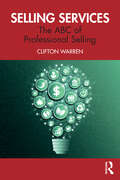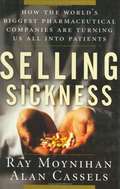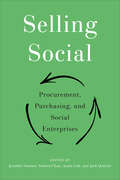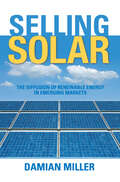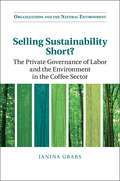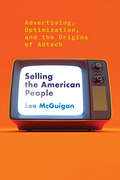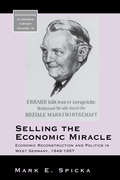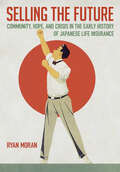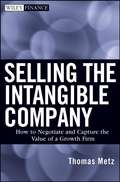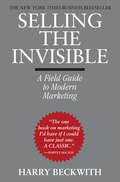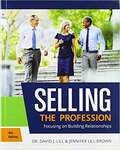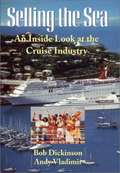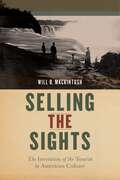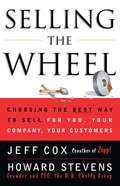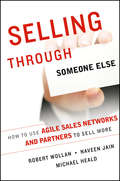- Table View
- List View
Selling Services: The ABC of Professional Selling
by Clifton WarrenMore than ever, our economy relies on the service industries – but selling services is far different from selling tangible products. This book demystifies the selling of intangibles and teaches the required skills to grow any professional service business. Leveraging his 30 years’ experience, leading sales expert Clifton Warren offers 26 lessons to help readers navigate the selling of complex and intangible solutions. Each chapter covers an important concept from A (Accountability) to Z (Zigzagging) in a concise and readable format, including a "to-do" action list that makes the book both a workbook and a study guide. By successfully applying the steps discussed in each chapter, professionals will substantially improve their performance and results, and anyone looking to drill down into specific topics will find additional resources to explore. B2B sales professionals in banking, insurance, finance, and other services, and small business owners such as lawyers, architects, and engineers, as well as professionals transitioning into sales roles, will appreciate the thorough and easy-to-follow guidance that this book provides.
Selling Sexy: Victoria’s Secret and the Unraveling of an American Icon
by Lauren Sherman Chantal FernandezThe story of how Victoria’s Secret skyrocketed from a tiny chain of boutiques to a retail phenomenon with more than $8 billion in annual sales at its peak—all while defining an impossible beauty standard for generations of American women—before the brand’s tight grip on the industry finally slippedVictoria’s Secret is one of the most influential and polarizing brands to ever infiltrate the psyche of the American consumer. Almost right at its start in the late 1970s, the company developed a cult following for its glamorous catalogs. Back then, shoppers had few alternatives to the stodgy department stores that sold most of the nation’s intimate apparel. By 1982, the founders of Victoria’s Secret avoided bankruptcy by selling to Les Wexner, the fast-fashion pioneer behind the Limited, whose empire of mall brands would go on to dominate American retail for forty years.Wexner turned Victoria’s Secret into a multibillion-dollar business, and the brand’s cultural influence soared thanks to its airbrushed advertisements and annual televised fashion show, which drew millions of viewers each year. Its supermodel spokeswomen, the sweet but sultry Angels, personified a new American beauty standard.But as our definition of beauty expanded, Victoria’s Secret failed to evolve and reached a crisis point. Meanwhile, Wexner became increasingly known for his complicated relationship with sex trafficker Jeffrey Epstein, his former financial adviser and confidant.Selling Sexy expertly draws from sources within Victoria’s Secret and across the industry to examine the unprecedented rise of one of the most innovative brands in retail history—a brand that today, under new ownership, is desperately trying to seduce shoppers again.
Selling Sickness: How the World's Biggest Pharmaceutical Companies Are Turning Us All Into Patients
by Ray Moynihan Alan CasselsThis book presents a valuable counterweight to the mind-numbing barrage of unproven diagnoses and just plain dysinformation that haunts the airwaves and even some medical journals.
Selling Social: Procurement, Purchasing, and Social Enterprises
by Jennifer Sumner Andrea Chan Annie Luk Jack QuarterSince the 2010s, all levels of governments in Canada have gradually initiated social procurement as a policy tool to further their social values and political agendas. Social enterprises of various shapes and sizes across the country have served as partners in the execution of those agendas. Selling Social examines the experiences of these enterprises in social procurement and social purchasing. Selling Social presents the findings of a three-year Canadian research project detailing experiences of work integration social enterprises (WISEs) selling their goods and services to organizational purchasers, including governments, businesses, and non-profit organizations. Drawing on survey findings and interviews, the book explores a diverse group of social enterprises from across Canada, showcasing their successes and their challenges based on real-life examples to aid social enterprises that are considering this path. The book emphasizes the importance of including social and environmental considerations in procurement and purchasing decisions, particularly at larger scales and through public policy. In doing so, Selling Social extends the understanding of social enterprises beyond their social and economic outcomes and into the broader movement towards responsible procurement and purchasing.
Selling Solar: The Diffusion of Renewable Energy in Emerging Markets
by Damian MillerTo solve the climate crisis, the world must make a wholesale shift to renewable energy technologies. With surging growth in emerging markets, this transformation takes on even greater urgency. The challenges - and opportunities - are immense. Selling Solar considers how such a shift might happen. Focusing on the case of solar photovoltaics, it shows how, at the start of the 21st century, this promising technology began to diffuse rapidly in select emerging markets, after years of struggling to take off. What were the initial barriers to diffusion? How were they overcome? Who did it? And how can this success be replicated? Drawing on literature on innovation diffusion and entrepreneurship, the author answers these questions, showing how entrepreneurs affected profound technological change not just through the solar systems they sold, but through the example they set to both new market entrants and policymakers. In analysing how this happened, this book offers important lessons for the diffusion of a range of renewable energy technologies in emerging markets, and for the advancement of the sector as a whole. Selling Solar is essential reading for anyone who believes in a renewable energy future and wants it sooner rather than later.
The Selling Sound: The Rise of the Country Music Industry
by Diane PecknoldFew expressions of popular culture have been shaped as profoundly by the relationship between commercialism and authenticity as country music has. While its apparent realism, sincerity, and frank depictions of everyday life are country's most obvious stylistic hallmarks, Diane Pecknold demonstrates that commercialism has been just as powerful a cultural narrative in its development. Listeners have long been deeply invested in the "business side" of country. When fans complained in the mid-1950s about elite control of the mass media, or when they expressed their gratitude that the Country Music Hall of Fame served as a physical symbol of the industry's power, they engaged directly with the commercial apparatus surrounding country music, not with particular songs or stars. In The Selling Sound, Pecknold explores how country music's commercialism, widely acknowledged but largely unexamined, has affected the way it is produced, the way it is received by fans and critics, and the way it is valued within the American cultural hierarchy. Pecknold draws on sources as diverse as radio advertising journals, fan magazines, Hollywood films, and interviews with industry insiders. Her sweeping social history encompasses the genre's early days as an adjunct of radio advertising in the 1920s, the friction between Billboard and more genre-oriented trade papers over generating the rankings that shaped radio play lists, the establishment of the Country Music Association, and the influence of rock 'n' roll on the trend toward single-genre radio stations. Tracing the rise of a large and influential network of country fan clubs, Pecknold highlights the significant promotional responsibilities assumed by club organizers until the early 1970s, when many of their tasks were taken over by professional publicists.
Selling Sounds: The Commercial Revolution in American Music
by David SuismanFrom Tin Pan Alley to grand opera, player-pianos to phonograph records, David Suisman's Selling Sounds explores the rise of music as big business and the creation of a radically new musical culture. Around the turn of the twentieth century, music entrepreneurs laid the foundation for today's vast industry, with new products, technologies, and commercial strategies to incorporate music into the daily rhythm of modern life. Popular songs filled the air with a new kind of musical pleasure, phonographs brought opera into the parlor, and celebrity performers like Enrico Caruso captivated the imagination of consumers from coast to coast. Selling Sounds uncovers the origins of the culture industry in music and chronicles how music ignited an auditory explosion that penetrated all aspects of society. It maps the growth of the music business across the social landscape -- in homes, theaters, department stores, schools -- and analyzes the effect of this development on everything from copyright law to the sensory environment. While music came to resemble other consumer goods, its distinct properties as sound ensured that its commercial growth and social impact would remain unique. Today, the music that surrounds us -- from iPods to ring tones to Muzak -- accompanies us everywhere from airports to grocery stores. The roots of this modern culture lie in the business of popular song, player-pianos, and phonographs of a century ago. Provocative, original, and lucidly written, Selling Sounds reveals the commercial architecture of America's musical life.
Selling Sunshine: Surviving Teenage Motherhood, Thriving in Luxury Real Estate, and Finally Finding My Voice
by Mary BonnetThe fan-favorite star of Netflix’s hit reality series Selling Sunset recalls her life in and out of the spotlight, an inspiring and surprising chronicle of adversity, tragedy, trauma, and success. In the streaming reality series Selling Sunset, Mary Fitzgerald Bonnet is the charismatic, calm, and level-headed agent who effortlessly lands multi-million-dollar homes while sidestepping the drama of a cutthroat business in one of the wealthiest and most glamorous places in the world. Often thought of as the “big sister” of her co-stars for her compassionate advice and uplifting attitude, Mary is admired for her unwavering kindness. But behind her sunny personality is a remarkable story of resilience, forged by a life filled with profound challenges.In Selling Sunshine, Mary candidly reveals the most grueling and darkest moments of her personal journey. Becoming a mother at sixteen, she was forced to rely on her own resolve and tenacity, juggling multiple jobs while attending school and caring for her son. With vulnerability and grace, Mary reflects on how her crash-course in adulthood not only changed her, but prepared her for the trials to come, including two painful divorces and toxic relationships. Despite the pain, she kept moving forward even in the aftermath of terrifying trauma.Yet no matter how many obstacles she faced, Mary refused to let the darkness extinguish her light. It was that same strength and determination that eventually carried her to the top of her field and helped her cope with unexpected fame. Talking about her experience on Selling Sunset, she offers a rare glimpse at cast dynamics and the drama behind the scenes, and reveals the lessons she’s learned—from staying true to yourself to projecting positivity by supporting colleagues. Unfiltered and genuine, Mary’s story will inspire readers to overcome life’s obstacles, and discover the power of finding their own sunshine. Selling Sunshine includes a 16-page color photo insert.
Selling Sustainability Short?: The Private Governance of Labor and the Environment in the Coffee Sector (Organizations and the Natural Environment)
by Janina GrabsCan private standards bring about more sustainable production practices? This question is of interest to conscientious consumers, academics studying the effectiveness of private regulation, and corporate social responsibility practitioners alike. Grabs provides an answer by combining an impact evaluation of 1,900 farmers with rich qualitative evidence from the coffee sectors of Honduras, Colombia and Costa Rica. Identifying an institutional design dilemma that private sustainability standards encounter as they scale up, this book shows how this dilemma plays out in the coffee industry. It highlights how the erosion of price premiums and the adaptation to buyers' preferences have curtailed standards' effectiveness in promoting sustainable practices that create economic opportunity costs for farmers, such as agroforestry or agroecology. It also provides a voice for coffee producers and value chain members to explain why the current system is failing in its mission to provide environmental, social, and economic co-benefits, and what changes are necessary to do better.
Selling Textiles in the Long Eighteenth Century
by Jon Stobart Bruno BlondéTextiles are a key component of the industrial and consumer revolutions, yet we lack a coherent picture of how the marketing of textiles varied across the long 18th century and between different regions. This book provides important new insights into the ways in which changes in the supply of textiles related to shifting patterns of demand.
Selling the American People: Advertising, Optimization, and the Origins of Adtech
by Lee McGuiganHow marketers learned to dream of optimization and speak in the idiom of management science well before the widespread use of the Internet.Algorithms, data extraction, digital marketers monetizing "eyeballs": these all seem like such recent features of our lives. And yet, Lee McGuigan tells us in this eye-opening book, digital advertising was well underway before the widespread use of the Internet. Explaining how marketers have brandished the tools of automation and management science to exploit new profit opportunities, Selling the American People traces data-driven surveillance all the way back to the 1950s, when the computerization of the advertising business began to blend science, technology, and calculative cultures in an ideology of optimization. With that ideology came adtech, a major infrastructure of digital capitalism.To help make sense of today's attention merchants and choice architects, McGuigan explores a few key questions: How did technical experts working at the intersection of data processing and management sciences come to command the center of gravity in the advertising and media industries? How did their ambition to remake marketing through mathematical optimization shape and reflect developments in digital technology? In short, where did adtech come from, and how did data-driven marketing come to mediate the daily encounters of people, products, and public spheres? His answers show how the advertising industry's efforts to bend information technologies toward its dream of efficiency and rational management helped to make "surveillance capitalism" one of the defining experiences of public life.
Selling the Amish: The Tourism of Nostalgia (Young Center Books in Anabaptist and Pietist Studies)
by Susan L. TrollingerMore than 19 million tourists flock to Amish Country each year, drawn by the opportunity to glimpse "a better time" and the quaint beauty of picturesque farmland and handcrafted quilts. What they may find, however, are elaborately themed town centers, outlet malls, or even a water park. Susan L. Trollinger explores this puzzling incongruity, showing that Amish tourism is anything but plain and simple.Selling the Amish takes readers on a virtual tour of three such tourist destinations in Ohio’s Amish Country, the world’s largest Amish settlement. Trollinger examines the visual rhetoric of these uniquely themed places—their architecture, interior decor, even their merchandise and souvenirs—and explains how these features create a setting and a story that brings tourists back year after year.This compelling story is, Trollinger argues, in part legitimized by the Amish themselves. To Americans faced with anxieties about modern life, being near the Amish way of life is comforting. The Amish seem to have escaped the rush of contemporary life, the confusion of gender relations, and the loss of ethnic heritage. While the Amish way supports the idealized experience of these tourist destinations, it also raises powerful questions. Tourists may want a life uncomplicated by technology, but would they be willing to drive around in horse-drawn buggies in order to achieve it?Trollinger's answers to important questions in her fascinating study of Amish Country tourism are sure to challenge readers’ understanding of this surprising cultural phenomenon.
Selling the Dream: How to Promote Your Product, Company, or Ideas - And Make A Difference - Using Everyday Evangelism
by Guy KawasakiFormer product manager for Apple Computers, Guy Kawasaki, discusses a new selling technique he names "evangelism."
Selling the Economic Miracle: Economic Reconstruction and Politics in West Germany, 1949-1957 (Monographs in German History #18)
by Mark E. SpickaThrough an examination of election campaign propaganda and various public relations campaigns, reflecting new electioneering techniques borrowed from the United States, this work explores how conservative political and economic groups sought to construct and sell a political meaning of the Social Market Economy and the Economic Miracle in West Germany during the 1950s.The political meaning of economics contributed to conservative electoral success, constructed a new belief in the free market economy within West German society, and provided legitimacy and political stability for the new Federal Republic of Germany.
Selling the Future: Community, Hope, and Crisis in the Early History of Japanese Life Insurance
by Ryan MoranIn Selling the Future, Ryan Moran explains how the life insurance industry in Japan exploited its association with mutuality and community to commodify and govern lives. Covering the years from the start of the industry in 1881 through the end of World War II, Moran describes insurance companies and government officials working together to create a picture of the future as precarious and dangerous. Since it was impossible for individual consumers to deal with every contingency on their own, insurance industry administrators argued that their usage of statistical data enabled them to chart the predictable future for the aggregate. Through insurance, companies and the state thus offered consumers a means to a perfectible future in an era filled with repeated crises. Life insurance functioned as an important modernist technology within Japan and its colonies to instantiate expectations for responsibility, to reconfigure meanings of mutuality, and to normalize new social formations (such as the nuclear family) as essential to life. Life insurance thus offers an important vehicle for examining the confluence of modes of mobilizing and organizing bodies, the expropriation of financial resources, and the action of disciplining workers into a capitalist system.
Selling the Intangible Company
by Thomas MetzIn Selling the Intangible Company, Thomas Metz helps entrepreneurs and venture capitalists to better understand the process of selling a company whose value is strategic. He addresses all the key issues surrounding the sale of a company in which the value is in its technology, its software, and its know-how-but has not yet shown up on its balance sheet. Filled with in-depth insights and expert advice, this book provides essential information for business professionals and technology CEOs who need to understand the nuances of selling a company with intangible value.
Selling the Invisible: A Field Guide to Modern Marketing
by Harry BeckwithSELLING THE INVISIBLE is a succinct and often entertaining look at the unique characteristics of services and their prospects, and how any service, from a home-based consultancy to a multinational brokerage, can turn more prospects into clients and keep them. SELLING THE INVISIBLE covers service marketing from start to finish. Filled with wonderful insights and written in a roll-up-your-sleeves, jargon-free, accessible style, such as: Greatness May Get You Nowhere Focus Groups Don'ts The More You Say, the Less People Hear & Seeing the Forest Around the Falling Trees.
Selling the Profession: Focus on Building Relationships
by David Lill Jennifer Lill BrownSelling: The Profession is the roadmap to a rewarding sales career! Today, more than ever, it is all about relationship building in a digital world. In the 8th edition of this field-tested guide to selling, you will learn to: <p><p> • Appreciate that you are selling every day, regardless of your career. <p> • Use social media to connect with potential customers. <p> • Make good first impressions and build rapport. <p> • Recognize social styles and nonverbal signals. <p> • Effectively manage your time. <p> • Uncover needs by asking questions and listening. <p><p> The authors have taken a refreshingly practical and modern approach to professional selling. The 8th edition is divided into two parts: <p><p> • Part 1 explores "Selling Success Fundamentals" by examining the foundational strategy pieces needed for building a long-lasting career. This includes how to manage your time, read nonverbal cues, communicate with others within and outside your company, and recognize what drives people to buy. <p><p> • Part 2 is all about the "Relationship Selling Cycle." The eight-step process will walk you through every interaction with potential customers--from prospecting and pre-approach to the close and extend to the actions needed after the close.
Selling the Sacred: Religion and Marketing from Crossfit to QAnon
by Mara Einstein Sarah McFarland TaylorThere’s religion in my marketing! There’s marketing in my religion! Selling the Sacred explores the religio-cultural and media implications of a two-sided phenomenon: marketing religion as a product and marketing products as religion. What do various forms of religion/marketing collaboration look like in the twenty-first century, and what does this tell us about American culture and society?Social and technological changes rapidly and continuously reframe religious and marketing landscapes. Crossfit is a “cult.” Televangelists use psychographics and data marketing. QAnon is a religion and big business. These are some of the examples highlighted in this collection, which engages themes related to capitalist narratives, issues related to gender and race, and the intersection of religion, politics, and marketing, among other key issues.The innovative contributors examine the phenomenon of selling the sacred, providing a better understanding of how marketing tactics, married with religious content, influence our thinking and everyday lives. These scholars bring to light how political, economic, and ideological agendas infuse the construction and presentation of the “sacred,” via more traditional religious institutions or consumer-product marketing. By examining religion and marketing broadly, this book offers engaging tools to recognize and unpack what gets sold as “sacred,” what’s at stake, and the consequences.A go-to resource for those working in marketing studies, religious studies, and media studies, Selling the Sacred is also a must-read for religious and marketing professionals.
Selling the Sea: An Inside Look at the Cruise Industry
by Bob Dickinson Andy VladimirAn insider's view of how the cruising business operates. "Selling the Sea" offers a complete picture of the cruise line industry along with step-by-step coverage of how to effectively market the cruising experience. This updated "Second Edition" features new coverage of how technology has impacted the industry, new niche markets in cruising, and expanded material on shipbuilding and design. It also includes insightful interviews with today's captains, social directors, food and beverage managers, and cruise line executives who have hands-on experience at the day-to-day workings of a cruise ship. Bob Dickinson is President and CEO of Carnival Cruise Lines and a member of the Board of Directors of the parent company Carnival Corporation. Andy Vladimir is a well-known business and travel writer, a member of the Editorial Board of the FIU Hospitality Review, and contributing editor of Quest magazine.
Selling the Sights: The Invention of the Tourist in American Culture (Early American Places #16)
by Will B. MackintoshA fascinating journey through the origins of American tourismIn the early nineteenth century, thanks to a booming transportation industry, Americans began to journey away from home simply for the sake of traveling, giving rise to a new cultural phenomenon —the tourist.In Selling the Sights, Will B. Mackintosh describes the origins and cultural significance of this new type of traveler and the moment in time when the emerging American market economy began to reshape the availability of geographical knowledge, the material conditions of travel, and the variety of destinations that sought to profit from visitors with money to spend. Entrepreneurs began to transform the critical steps of travel—deciding where to go and how to get there—into commodities that could be produced in volume and sold to a marketplace of consumers. The identities of Americans prosperous enough to afford such commodities were fundamentally changed as they came to define themselves through the consumption of experiences.Mackintosh ultimately demonstrates that the cultural values and market forces surrounding tourism in the early nineteenth century continue to shape our experience of travel to this day.
Selling the Welfare State: The Privatisation of Public Housing (Routledge Revivals)
by Ray Forrest Alan MurieOriginally published in 1988, this book offers the first comprehensive and critical analysis of the privatisation of public housing in Britain. It outlines the historical background to the growth of public housing and the developing political debatea surrounding its disposal. The main emphasis in the book, however, is on the ways in which privatisation in housing links to other key changes in British society. The long trend for British social housing to become a welfare housing sector is related to evidence of growing social polarisation and segregation. Within this overall context, the book explores the uneven spatial and social consequences of the policy.
Selling the Wheel: Choosing the Best Way to Sell For You, Your Company, and Your Customers
by Jeff Cox Howard StevensSelling the Wheel is a fascinating story about sales and marketing written in the form of an ancient parable: Once upon a time, long ago, a resourceful fellow named Max came up with a brilliant idea and invented the Wheel. But human beings, who had been getting along without the Wheel for thousands of years, did not instantly appreciate their need for this clever invention.... This is the challenge facing Max, as dramatized by Jeff Cox, coauthor of the bestselling business novels Zapp! and The Goal, Selling the Wheel is based on the pioneering research of Howard Stevens's employment-testing and customer-research firm, the H. R. Chally Group. In the story, Max and his wife, Minnie, learn what it takes to market the Wheel. With the help of Ozzie the Oracle, they discover four essential selling styles -- Closer, Wizard, Relationship Builder, and Captain & Crew -- and come to understand how each style is suited to a different type of salesperson. They learn that as markets evolve, selling styles and strategies must change. There is no single right way -- and no company can be all things to all people. This critical lesson is as valuable to salespeople as it is to sales managers. Writer Jeff Cox has the amazing gift for translating technical ideas into creative, engaging stories, and his collaboration with sales and marketing expert Howard Stevens is based on empirical research collected from 250,000 salespeople, more than 1,500 people in corporate sales, and interviews with more than 100,000 actual customers who rated the strengths and weaknesses of the salespeople serving them. Packed with practical tips for salespeople, entrepreneurs, marketing managers, and business students, Selling the Wheel is an irresistible guide to sales styles, strategies, and markets.
Selling Through Someone Else: How to Use Agile Sales Networks and Partners to Sell More
by Robert Wollan Michael Heald Naveen JainExperience the growth multiplier effect through transforming the distribution and sales network Selling Through Someone Else tackles new opportunities to drive company growth by taking a fresh look at the customer smart distribution and sales process.<P><P> The authors, from Accenture, one of the world's largest consulting companies, explain how companies can be smarter about what their customers truly want and maximize the return on investment from all available resources for growth opportunities by exploring creative distribution options, including leveraging partners, online outlets, iPads/tablets, your traditional sales force, and more. Selling <P>Through Someone Else demonstrates that traditional approaches are no longer effective and how, by capitalizing on converging forces, companies can transform their "sales" approaches to grow revenue, and enhance customer and brand loyalty. Explores how globalization, new competitors, and low-cost threats are reshaping the way sales is happening today, and how to prepare your company to be successful in this new dynamic and iterative selling model Shows how analytics, the shift to digital selling and mobile sales tools, and new approaches to sales operations can reshape the entire sales function Demonstrates how new ecosystems of partners are created, managed, and incented to drive greater sales and profitability Accenture has helped numerous clients collaborate across IT, Sales, and Marketing to dramatically grow distribution and adapt to the different "playing field" of today. Selling through Someone Else applies the trends and lessons learned from Fortune 500 and Global 500 companies to mid-sized enterprises and small-medium businesses owners.
Selling to Anyone Over the Phone: Connect With Every Customer; Generate Better Leads; Close More Sales
by Renee P. Walkup Sandra MckeeIn a clear, friendly tone, Selling to Anyone over the Phone shows sellers how to develop exceptional phone skills and close more sales faster. Few sales professionals have ever had any training in how to sell over the phone; this book will help them build rapport, generate excitement about a product and more.
